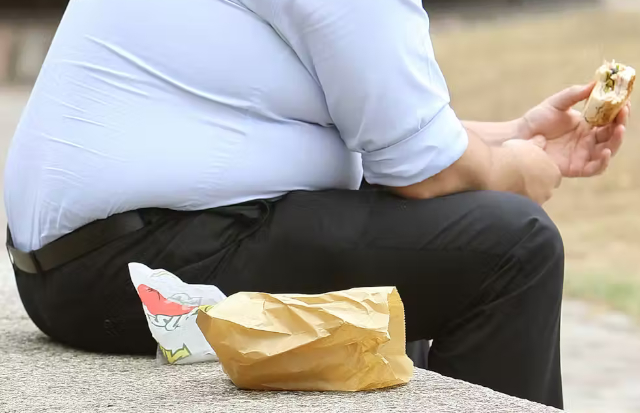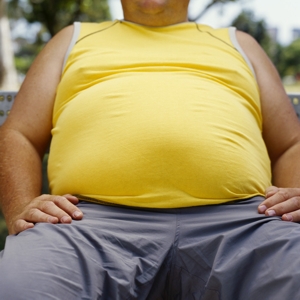A new UK study has found – and at first I found it hard to believe – claims EVERYONE there fibs, to themselves and others, about how much they eat each day. And it’s not a little white lie, either: on average, they’re eating almost one-third more than the official recommendation…
 According to the World Health Organization, ‘almost all’ of the
According to the World Health Organization, ‘almost all’ of the
UK’s male population will be overweight or obese by 2030…
Well… You’re bound to gain weight on a diet like that, right? Unless you’re a serious athlete in training, a construction worker or a longshoreman. But the vast majority of us are none of those things. And on top of eating too much, we don’t exercise enough. The result, in the UK at least, is that just shy of 28 percent of the population is not just overweight but outright obese, and another third is clinically overweight. That’s a huge burden on the National Health System. And the lives of the afflicted are being seriously affected – and shortened.
So why do people do it?
There are many theories about why people overeat. Some researchers say there’s a problem with the part of their brains that receive satiety signals from the gut, or the mechanisms in the gut that send them. Others say some folks (most?) have an uncontrollable urge to eat, perhaps left over from pre-historic times when you ate all you could when food was available, because it might be a long time before it was available again. Others say humans are hard-wired to crave fat, salt and sugar. There are more theories, but those are the main ones. If true, they’re more than sufficient to cause the UK’s, and the world’s, obesity crisis all by themselves.
And why do they lie about it?
Whatever the reason for eating too much, researchers at the University of Essex were surprised to discover that EVERYBODY (in their words) lies about overeating. The team, led by Professor Gavin Sandercock from the School of Sport, Rehabilitation, and Exercise Sciences, set out to see if obese people lied about their food intake, thinking that might be one cause of their condition.
The study included 221 adults with an average age of 54 and a range of body shapes. They were asked to keep food diaries and researchers measured how much they really consumed using urine tests.
What they found
According to an abstract of the study report, obese people misreported how much they ate by an average of 1200 calories and slimmer participants undereporterd what they ate by 800 calories. However, obese people actually burnt 13 per cent or 400 calories more energy. That’s because it takes more energy for obese people to do the usual day to day things – hauling around the extra weight. The researchers came up with a math fix to equalize the playing field between the thin and the obese.
“When we took into account the different body size and the different energy needs they have there was no difference in how much they underreported their food intake,” Sandercock says. “The idea that obese people lie about their food intake is wrong – it’s simply that as energy requirements increase with a larger body size there is more error between what people report and what they actually eat.”
And they discovered that everyone lied, whether they were obese or non-obese, about how much they consumed by the same amount – claiming they consumed 1,800 (adjusted for the error) calories on average.
The takeaway
Sandercock says that the UK government’s recommendations for daily food consumption need a major overhaul. Because they currentlky assume that obese people lie about their eating and thin people don’t.
“Recognising that the measures of energy intake are incorrect might result in the setting of more realistic targets,” Sandercock suggest. “Additionally, changing the narrative around obese people fibbing about their energy intake might change the focus to investigating dietary risk factors for obesity, such as foods with high-energy density, processed foods, high-fat low-fibre foods and sugary beverages, all of which drive a high energy intake.”
My take
Interesting, how this new study report some out just days after the UK government announced it would delay by a year the imposition of new rules banning TV junk food ads before 9 p.m. and banning fast food resto BOGO (Buy One, Get One Free) promotions all together. The lawmakers said the industry needed more time to adjust. I think they also looked at the numbers (2/3 of the voting base overweight or obese) and decided not to aggravate them too much either.
But what amazed me most was the finding that virtually everyone under-reports how much they eat. It’s one thing to fib to the doctor or the researchers. But quite another to lie to yourself. Denial will just get you a shorter, more unhealthy life.
Muse on that…
~ Maggie J.

